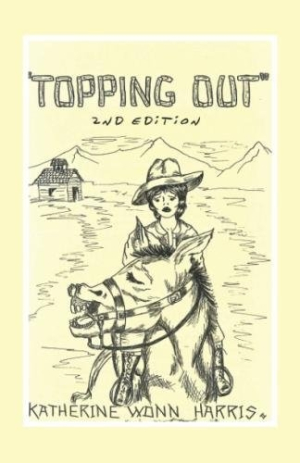Topping Out
Without sugarcoating the harshness of ranchers’ lives, Topping Out is a broad-canvas memoir about a way of life valued for the freedom, beauty, and independence it provided.
Katherine Wonn Harris’s winning memoir, Topping Out, captures the lives of old-time cattle ranchers in Idaho’s mountainous Salmon River country.
A century ago, Harris (then Katherine Wonn) was sixteen years old; she added two years to her age to secure a yearlong teaching position in Idaho. At seventy, she wrote about those experiences. This memoir details a vanished way of life.
The beautifully evoked setting is rugged: foothills are ringed by mountains, rutted with narrow valleys and shallow rivers. Harris discovers that her post in White Bird, though only a short distance from the railroad’s end as the crow flies, requires hours of travel in a wagon, which ferries her to the home of the Sansons, the local ranch family she lodges with.
Reaching her six-pupil schoolhouse requires an arduous, often dangerously slippery daily commute by mule. The book goes beyond standard classroom tales, taking a wider view of the land and the people who live on it. Even the school’s pupils, the children of local ranchers, are seen through this lens; they are often as much help to Harris as she is to them.
Though written at a distance of more than fifty years, the account captures the bounce and resilience of Harris’s youth. She adapts to the challenges and develops an affectionate bond with her world. Smokey the mule is as much companion as conveyance; when the son of the couple she’s staying with asks her to a dance hours of hard travel away, she doesn’t hesitate to accept. Though there are no big incidents, the liveliness of Harris’s voice keeps the pace brisk.
At the end of the school year, the scene shifts to a summer teaching job with a different group of ranchers, set at the end of the period when moving cattle to high mountain pastures meant moving the entire family with them. While the adults camp with the cattle, the children live in a tent camp farther down the mountain, attending classes in a tent school.
Here again, Harris energetically describes her added duties as substitute parent, cook, tender of small wounds, and overseer of taking the children to the higher camp each weekend. She takes advantage of half a century of hindsight to draw modern readers into a way of life that no longer exists, remembering the lost skill of creating a pack train and recalling how canned foods were considered the height of luxury on the frontier.
Settings are excellently painted. The prose is sparing and unfussy. Brief character sketches make the sparsely populated region seem full rather than lonely, as do accounts of Smokey the mule and a little dog name Maxie. The author’s intelligent and adventuresome personality shines through, making her appeal to her new neighbors clear; a well-placed chapter on her childhood explains her resilience in tough surroundings.
A useful and entertaining glossary of western lingo is included. Illustrations by Bonnie D. Joseph, which appeared in the original 1971 edition of the book, enhance the personal feel of the text, as does a photo of Harris and her map of Salmon River country.
Without sugarcoating the harshness of ranchers’ lives, Topping Out is a broad-canvas memoir about a way of life valued for the freedom, beauty, and independence it provided.
Reviewed by
Susan Waggoner
Disclosure: This article is not an endorsement, but a review. The publisher of this book provided free copies of the book and paid a small fee to have their book reviewed by a professional reviewer. Foreword Reviews and Clarion Reviews make no guarantee that the publisher will receive a positive review. Foreword Magazine, Inc. is disclosing this in accordance with the Federal Trade Commission’s 16 CFR, Part 255.

